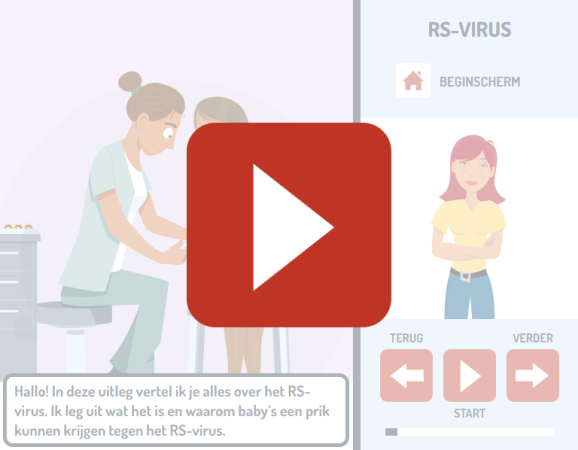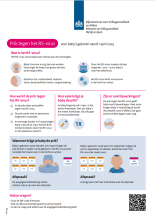The infant injection against RSV protects babies from serious illness due to respiratory syncytial virus (RSV). Babies will be offered the injection against RSV from autumn 2025 on. This injection is for babies born on or after 1 April 2025.
Factsheet on RSV injection
| Protects against | Respiratory syncytial virus (RSV) |
|---|---|
| Given at | 0 tot 6 months. Babies born from October through March will receive the injection within 2 weeks after being born. Babies born from April through September will receive the injection in September or October. |
| Period of protection | About 6 months |
| Common side effects | The injection almost never has side effects. Very occasionally, babies may get a rash, or the injection site may be red or puffy for a bit. Fever hardly ever happens. If your baby gets a fever, consult the GP. |
When to get the RSV injection
RSV is mainly seen in autumn and winter. The injection against RSV offers protection for about 6 months. That is why the season when your baby is born also determines when the jab will be offered.
Look at the table below to see when the injection will be offered to your baby. Note: the RSV injection is for babies born on or after 1 April 2025.
| My baby was born in: | My baby is scheduled for the RSV |
|---|---|
| January, February, March | Within 2 weeks after the birth |
| April, May, June, July, August, September | In September or Oktober |
| October, November, December | Within 2 weeks after the birth |
The RSV injection is given as an injection in the upper leg. Babies are vaccinated once, and only within the first year.
The RSV injection is offered in 2025 to babies who are the most vulnerable and have the highest risk of a severe RSV infection and hospitalization. These are the youngest babies, who are born after April 1, 2025. From 2026 onwards, and in the following years, all babies will be offered a RSV injection.
Babies are already being vaccinated against RSV in other European countries. In those countries, RSV-related hospital admissions for babies have decreased by 80%.
Video: Hoe werkt de prik tegen RS-virus?
RSV-prik explainer. Bescherming voor je baby tegen ernstige ziekte door het RS-virus met een prik in het juiste seizoen. Hoe werkt dat precies?
PRESENTATRICE: Wat is het RS-virus en hoe kun je je baby beschermen? Het RS-virus veroorzaakt een infectie aan de luchtwegen. Vooral jonge baby's kunnen er erg ziek van worden. Ze kunnen benauwd worden en koorts krijgen, maar ook een longontsteking. Soms komen ze zelfs in het ziekenhuis terecht. Gelukkig is er een prik die baby's beschermt tegen ernstig ziek worden door het RS-virus. Je baby krijgt de prik één keer in het bovenbeentje. Alleen baby's in hun eerste levensjaar krijgen de prik, omdat vooral de jongste kindjes het meest kwetsbaar zijn. De prik beschermt ongeveer zes maanden tegen het virus. Het RS-virus komt vooral voor in de herfst en winter. Het seizoen waarin je baby wordt geboren
bepaalt wanneer je kind de prik krijgt. Is je baby geboren tussen oktober en maart, dan krijgt je baby de prik twee weken na de geboorte. Is je kindje geboren tussen april en september, dan krijgt je baby de prik in september of oktober. De prik is geen vaccinatie, maar een immunisatie. Dit betekent dat de prik kant-en-klare antistoffen bevat waardoor je baby meteen beschermd wordt. Het voordeel hiervan is dat bijwerkingen bijna niet voorkomen. Heel soms kan het rond de plek van de prik korte tijd rood of dikker zijn of krijgen baby's huiduitslag of koorts. Bij koorts is het verstandig om de huisarts te bellen, omdat koorts ook door iets anders kan komen.
[Logo Rijksoverheid. Rijksinstituut voor Volksgezondheid en Milieu. Ministerie van Volksgezondheid, Welzijn en Sport. Meer weten? Rsvirusprik.nl.]
| When? | Within 2 to 14 days after the injection |
|---|---|
| Happens sometimes | The RSV injection has very few side effects. Very occasionally, babies can suffer from:
|
| Good to know | The injection against RSV is in the form of an injection of antibodies. This is known as immunisation. It does not work exactly the same as a vaccine. A injection helps the body generate its own antibodies. This can cause side effects. An antibody injection does not make the body produce antibodies itself. That is why there are almost never any side effects. |
The RSV injection contains antibodies against RSV. An antibody injection is a form of passive immunisation. It is not exactly the same as a jab. When a person is vaccinated, the body makes its own antibodies. In passive immunisation, those antibodies are already present in the injection. It does not make the body produce antibodies itself.
The page on Vaccine information leaflets also includes the information leaflet about the RSV injection.
You usually do not need to have your child vaccinated early (before the recommended age) because you are planning a trip outside the Netherlands – unless that country has a high risk of infectious diseases. Will you be travelling abroad for a short trip or a longer period, and does your child need injections? Check with the youth healthcare services (JGZ) if you need to adjust your child’s jab schedule.
Do you have questions about jabs that you need for a trip outside the Netherlands? Consult the National Coordination Centre for Travellers Advice (LCR) website (in Dutch). The LCR website includes information on which jabs are advisable and where to make an appointment in your area.
If your child is ill, please contact the organisation that will give the injection: the local youth healthcare services (well-baby clinic). They can tell you if it is a good idea to get the injection right now. Sometimes the injection may be postponed for a bit. The injection is also safe for children with reduced immunity.
The RSV injection is important for all babies. That includes babies with impaired immunity as a result of illness or medication. The injection is safe for children with impaired immunity, but it may be less effective for them. Children with these health conditions always have their case supervised by a treating paediatrician, who can offer more information.
The folder Protect your baby against RSV presents clear information about RSV and how the RSV injection works.
In onze infographic over de prik tegen het RS-virus vind je in woord en beeld wat het RS-virus is, hoe de prik tegen het RS-virus werkt en of er bijwerkingen zijn.



